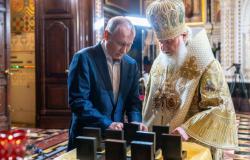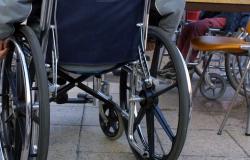For the 50th anniversary of the death of the dictator, the socialist government of Pedro Sánchez is launching this Wednesday the first in a series of unprecedented memorial events. The right, which maintains an ambiguous relationship with the dictatorship, is indignant.
Half a century after his death, the figure of Caudillo remains most problematic. This Wednesday, Spanish Prime Minister Pedro Sánchez inaugurates a commemorative ceremony at the Reina Sofia Museum – the one which houses the painting Guernicaby Picasso – for the 50th anniversary of the death of Francisco Franco. The former dictator died on November 20, 1975, in his bed, at the age of 82, following an illness. In December, the socialist government announced the initiative as a vast work of remembrance throughout 2025. By the end of the year, more than a hundred events and celebrations will take place under the name “Spain in freedom» – Spain at large. And that was all it took to turn the country upside down, minds overheated, and the controversy incandescent.
“It’s about highlighting the great democratic transformation experienced over this half-century”assured Pedro Sánchez. In his eyes, he is «important» to organize memorial events in schools, universities, museums, etc., in particular so that younger generations know the «difficile» past of Spain. And this commemorative avalanche is a first: until now, only far-right groups celebrated the memory of the very general every November 20, and successive governments took care to ignore this nauseating memory. Even the socialist José Luis Zapatero, who had initiated the laws of “historical memory” (recognition of the victims of the dictatorship), had declined any ceremony in 2005, on the occasion of the 30th anniversary of his death.
Conservatives irritated, the monarchy embarrassed
The announcement of this hundred commemorative acts this year could not polarize more, in a political context already marked by a sharp left-right divide. “It’s a waste of time”expressed in substance the conservative leader Alberto Núñez Feijóo. As for his parliamentary spokesperson Miguel Tellado, he made a gesture of contempt for this initiative by being surprised at the interest that could be shown in a “phlebitis”in allusion to the illness from which Franco suffered in the months preceding his rather peaceful death. King Felipe VI, head of state since the abdication of his father in June 2014, finds himself in an embarrassment: if the royal house has indicated that he will participate in some commemorations, the sovereign does not will not attend the inauguration this Wednesday “for agenda reasons”. Translation: his presence would signify a form of assent to a memory dynamic which condemns the dictator who had appointed his own father as his successor.
On the right, the said “pedagogical commemorations” driven by the socialists would constitute a sort of stab in the purulence of national history: “The reason for this commemorative initiative is none other than to put our finger on the most painful wound in our historyunderlines Jose Antonio Zarzalejos, of the conservative newspaper The Confidential. The objective is to wipe out the conciliation efforts undertaken by the right and the left since the democratic transition.”
Memory revisited
If the debate is so sensitive, it is because Spain has never fully condemned its dictatorial past. Certainly, in November 2002, at the initiative of the liberal José María Aznar, the Lower House passed a resolution condemning the Franco dictatorship. But this rejection was superficial, avoiding mention of the terrible repression following the civil war (1936-1939), the exile of half a million Spaniards, and the abuses committed until the end of the regime in 1975. . “Instead of commemorating the death of the dictator, it would be wiser to celebrate the birth of freedom from the free elections of September 1977defends the editorialist ofThe Country Soledad Gallego-Díaz. However, the right has always turned a blind eye to this past, when elsewhere we discussed the figures of Pétain, Mussolini or Hitler.
In power, the People’s Party (PP, conservative right) practiced burying its head in the sand. It was not until Pedro Sánchez that, on October 24, 2019, the dictator’s remains were transferred from the imposing public site in Valle de los Caidos (west of Madrid) to the discreet Mingorrubio cemetery, north of the capital. Since then, the political debate has heated up with the strong rise of the far right, Vox, which unashamedly calls itself Caudillo. In coalition with the PP, it initiated so-called “concord” laws in the regions of Valencia, Extremadura and Castile-Leon: Francoism is revisited in a more positive sense, and placed on the same level as the Second Republic Spanish, between 1931 and 1936.






